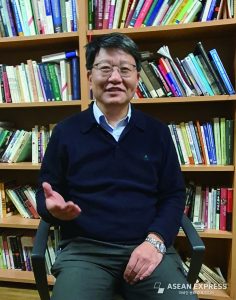Message from the Director

“To strengthen and renew SNUAC’s research in identity and regional studies.”
Regional Studies, as an academic discipline, was born as a product of Imperialism and the Cold War world order. It was during this period in world history that modern states saw the crucial need to study other societies and cultures to realize their own political and economic interests. However, even long before modern political systems and academia were estabilished, people could not survive without incessant material and cultural exchanges with other people in and outside their own region. The reason that our world today could have homogeneity and diversity is that each region, country, and society has long been connected with others.
The trend of globalization, having begun to accelerate after the 1980s, is now creating hyper-connectivity never seen before in human society. The time-space compression due to the advancement of communication and transportation technology promotes the mobility of humans, materials, and cultural resources, thus increasing interdependency and producing various issues and conflicts. According to such changes, the importance of regional studies continues to grow. For coexistence with nature, tolerance for others, and amelioration of uneven development and inequality, the role of regional studies has become more urgent than ever as it enhances the mutual understanding and cooperative practice of the residents of the global village. Since its establishment in 2009, SNUAC has been undertaking tremendous efforts to be a core institute for regional studies not only domestically but also internationally. As a result, we are now rigorously operating our educational and academic activities with seven regional research centers, eight thematic research programs, and the HK+ Mega-Asia Research Project supported by the National Research Foundation as of 2024. Also, over 130 researchers and administrative staffs are cooperating with related departments at Seoul National University, international research institutions, and researchers. To intensify the multidisciplinary, multiregional, and international cooperative research based on these capabilities, SNUAC has been holding over 300 academic seminars and conferences every year.
SNUAC will continue to seek to establish the identity of Asian regional studies, practical solutions for the issues of globalization, society, and industry, and pursue the popularization of knowledge. To this end, we need not only the academic efforts of the members of SNUAC but also close cooperation with institutions and experts worldwide interested in the Asian region. I sincerely hope that SNUAC will continue to contribute to the mutual human understanding of cohabitation.
Thank you.
Suhong Chae
Director of SNUAC
